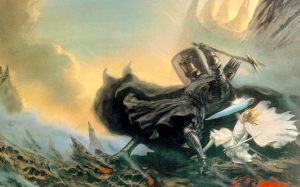Lawful and Holy Pessimism, Expectant hope and the Eucatastrophe
By Hilary White
I have been wondering why I and a few other Trads haven’t experienced the slightest temptation to give up on the Church, despite the monstrous turn of events over the last 6 years. I don’t think it’s because of any greater levels of faithfulness or courage or determination. I think it has to do with the mentality that we started with; that we never expected anything to go well. We started out with a mindset of expecting that the affairs of the world would always naturally go badly, and generally get worse, and the hope we had was not in the lies of the modern philosophy that everything is getting better and better.
This is a mental attitude that has more to do with the way we’re raised than anything else. When the utter monstrosity of the modern papacy, of the NuCatholic Paradigm, the horrors of the modern secular world, start to become impossible even for our fellow Catholics to continue to deny, none of us are the least bit shocked or even surprised. People freak out about Bergoglio or the sex abuse crisis or the treason of the clerics because they started out expecting better things. They believed, perhaps, the modernist way of thinking that the world is getting better and everything should be going well, and are left without a worldview, a mental framework adequate to cope when that fails to happen.
For us, for people with a mind of the past, all that is just Tuesday.
But because there has been a general creep of modernist thinking among Catholics, this lawful and rational pessimism – that always starts with the assumption that things will generally get worse and worse until the end, and that this is the way things are supposed to be… “vale of tears” and all that – we are accused of lacking the Theological Virtue of Hope. What they get wrong is thinking that the TVoH is the same thing as material, secular “optimism”. To me optimism – the idea that somehow fallen human nature can be just magically overcome one day and we’re going to figure out how to create a paradise on earth – is a kind of blasphemy.
In real life, and not too far in the past, utopian optimism has given us the most monstrous human actions ever recorded in a long, long history of human evil. The 20th century really topped the charts in human evil, but it had a new and previously unimagined flavour. Dictators, conquerers and murderous warlords were hardly lacking in history; but this is the first time in recorded history that they justified their actions by telling us mass murder was for our own good, that it was merely the unfortunately necessary prelude to the establishment of a grand design in which suffering would be eliminated forever.
In short, Utopian Material Optimism –> squirming faithlessly away from the Cross –> thinking we’re able to solve All the Things our way –> Auschwitz. The 20th century was the ideological utopian century; and also the time of industrialised murder. These two things are not unrelated.
Something that is starting to enter into the cultural discourse right now is the philosophy of Tolkien, whose work fully embraced the philosophy of holy pessimism. We don’t “hope” for a human, material paradise on earth. We look to our duty, and have what he called in his elvish language, “estel,” which is translated roughly as “hope” but in fact has a more nuanced meaning; it is the expectant hope that when you do what is right, even if things go badly, there will be an outcome intended by and wrought by the Power beyond ours. The unexpected resolution, the “eucatastrophe.” The sudden, unlooked-for turning-around of an unavoidable doom – that brings about the happy ending we all wish for, and the restoration of all things in Christ.
“We’re all like Sam in the black of night in the enemy’s own land, struck by the beauty of a white star.”
“There, peeping among the cloud wrack above a dark tor high up in the mountains, Sam saw a white star twinkle for a while. The beauty of it smote his heart as he looked up out of the forsaken land and h return to him. For like a shaft clear and cold the thought pierced him that in the end the shadow was only a small and passing thing that there was light and high beauty forever beyond its reach.“
